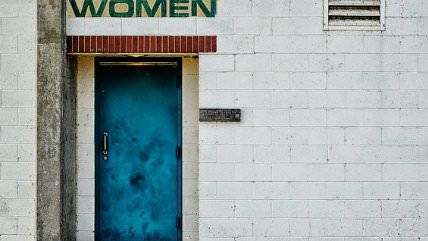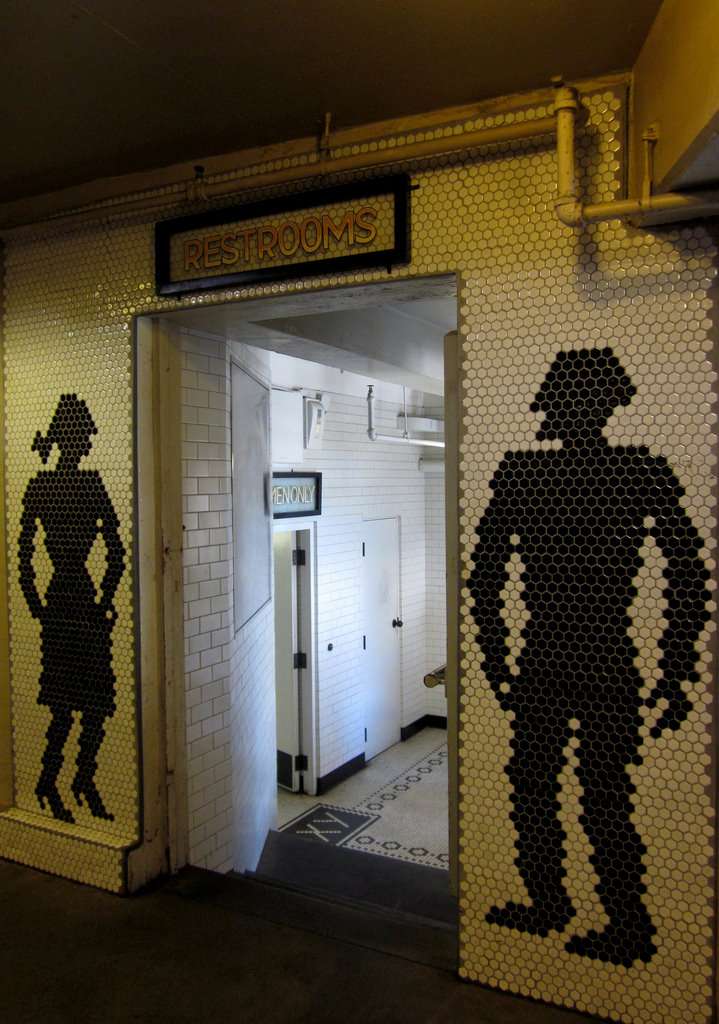Florida Bill Would Make Using Opposite-Sex Bathroom a Crime
Business owners who don't gender police their restrooms could be sued.


Ever used a public bathroom intended for the opposite sex? Like many women, I've certainly resorted to this when the ladies' line was too long. In Florida, that could get us jailed for a year or faced with a $1,000 fine if one overreaching lawmaker gets his way.
On Wednesday, state Rep. Frank Artiles (R-Miami) introduced a bill that would make using public bathrooms designated for the opposite sex a misdemeanor crime, punishable by up to one year in jail or a fine of $1,000. It would also allow someone using a single-sex restroom to sue an opposite-sex interloper and the place of business for any such breach. "The purpose of this act is to secure privacy and safety for all individuals using single-sex public facilities," the bill states.
Rep. Artiles' worry is that public bathrooms present a perfect place for "crimes against individuals using those facilities, including, but not limited to, assault, battery, molestation, rape, voyeurism, and exhibitionism." I've watched enough horror movies and Law & Order to know that this may be true, but that's also taught me that psycho-killers and rapists aren't particularly bothered by trespassing. When you're not phased by killing and raping being against the law, you probably aren't too phased by entering a prohibited bathroom, either. Besides, with public bathrooms having been around a while in Florida, their potential for attracting criminal behavior mustn't be especially new. Why now? What's changed?
As you might have guessed, there hasn't been a sudden spike in bathroom crime in the sunshine state. And this bill isn't really aimed at someone sneaking a pee in the men's room when the women's room is occupied—though that, too, would be criminalized. The reason for this bill, at this point in time, seems to be the fear that trans women might be using women's bathrooms and trans men might be using men's bathrooms.
Rep. Artiles previously campaigned against a Miami-Dade County proposal to add "gender identity" and "gender expression" to the list of categories protected by anti-discrimination statutes. His objection was not principled opposition to these sort of laws in general, however—he just wanted the statute rewritten to exempt bathrooms, locker rooms, and dressing rooms.
His current bathroom micro-management bill specifically states (emphasis mine) that sex "means a person's biological sex, either male or female, at birth." (I guess Artiles has never heard of the approximately 1 in 2,000 people born intersex.) It goes on to reiterate that "the term 'male' means a person born as a biological male and the term 'female' means a person born as a biological female." No matter if a person dresses as a woman, lives as a woman, and is known to everyone around them as a woman—if they were born with a Y-chromosome, Artiles thinks they should be jailed for using a woman's bathroom. The bill's language ensures that not even trans individuals who had genital-reassignment surgery or took other steps to physically transition to another gender would be exempt.
Of course, most of us don't go around scrutinizing our fellow same-sex bathroom-goers to make sure they seem sufficiently feminine or masculine. If a trans person "passes" well enough for the gender they identify as, no one will be the wiser. And even if they don't, most people are unlikely to a) care, or b) care enough to confront a stranger about whether they're "really" a woman or a man. But some people would. If a business owner or fellow customer who disapproves of or fears trans people would recognize someone as trans and see them going into the "wrong" bathroom, this law would give them a tool to have that individual arrested. In the case of business owners, it would even provide an incentive to have trans people arrested, since customers could sue establishments for another customer's "unlawful entry."
And just as many trans people present perfectly as the gender they identify with, a lot of biological males and females may be a bit gender ambiguous, by choice or happenstance. Can you imagine the harassment any number of people might face if we suddenly asked all of our bartenders to gender police the bathrooms?


Show Comments (152)